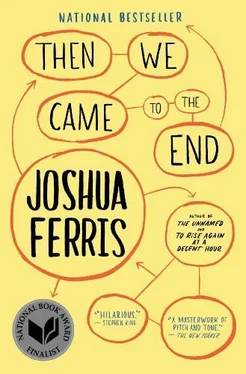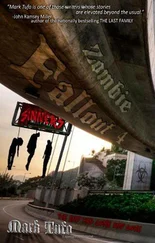“Let’s say you have breast cancer,” he said next to his father. “What’s funny about it? How do you want to be cheered up?”
His father gave it a second’s thought. “Call me up with a scenario where I have breast cancer and you ask what’s funny about it,” he replied. “That should do the trick.”
“I’m serious, Dad,” Jim urged him. “What’s funny about breast cancer?”
“What’s funny about it? Son,” he said. “Very little.”
He tried to explain the assignment to his father but his description was a muddled briefing of the morphing project, and it ended with Jim saying he’d have to get back to him with certain details. “Sounds to me like you need to figure out what the hell’s going on over there,” said his father.
“Well, it’s a confusing assignment.”
“Talk to your great-uncle about this,” his father suggested. “I imagine he’d be a good resource.”
Everyone knew that Jim’s creative coup d’état came from a suggestion from his great-uncle Max, who lived on a farm in Iowa. According to Jim, his uncle had Mexicans running the farm while his days were spent in the farmhouse basement reconstructing a real train car from scratch, which was the only thing he had shown any interest in since the passing of his wife. He traveled to old train yards collecting the parts. When someone asked him at a family function why he was doing it, his answer was so that no one could remove the train car from the basement after he died. When it was pointed out to him that the boxcar could be removed by dismantling it, reversing the process by which he had constructed it, Jim’s great-uncle replied that no Jackers alive was willing to work that hard at anything. Picturing this ornery farmer at his lunatic task, lost in the rural delusions of grief and old age, we probably laughed a little too hard, spurring Jim to defend his uncle’s singular hobby.
“What?” he said. “It’s like Legos, but for adults.”
That only made us laugh harder.
“The man lost his wife,” he said.
Jim was so desperate one day to come up with inspiration for an ad, he exhausted his traditional list of people, broke down, and called his uncle Max. “You know how when you buy a new car,” he began — and immediately Max interrupted him.
“I haven’t bought a new car in thirty-five years,” said Max.
Jim suspected then that this was probably not a man with his finger on the pulse of the buying public. Patiently he tried explaining his assignment. When people buy a new car, he said, they usually have an image of themselves that corresponds to the car they buy. Jim wanted to know from Max how Max would want to perceive himself when purchasing a new ink cartridge.
“Ink cartridge?”
“Yeah,” said Jim. “You know, for your printer.”
“Uh-huh,” said Max.
We had a client at the time whose marketing objective was to make their customers feel like heroes when purchasing one of their ink cartridges. Our charge in every communication was to inspire the potential buyer with the heroic possibilities of man-using-ink-cartridge.
“I want to see myself as Shakespeare,” Max said. “What’s this for, anyway?”
Shakespeare, thought Jim. Shakespeare. That’s not bad.
“It’s for a client of ours,” he said. “They make printers and ink cartridges and that sort of thing. I’m trying to come up with an ad that makes you want to buy our specific ink cartridge after you see our ad because it inspires you and makes you feel like a hero. Will you tell me more about wanting to feel like Shakespeare?”
“So you’re trying to sell ink cartridges?”
“That’s right.”
Another long pause. “Do you have a pen?” his uncle asked. He began to quote: “‘It was the best of times, it was the worst of times, it was the age of wisdom, it was the age of foolishness, it was the epoch of belief, it was the epoch of incredulity. .’”
Finally Jim reached out for a pen. He tried to keep up with him. At a certain point, Max stopped quoting and told Jim the lines should start to fade out, gradually at first, eventually disappearing altogether. Then he suggested the headline: “A Great Writer Needs a Great Ink Cartridge.” The small print could explain how, if ink cartridges had been used throughout time, the history of literature might have been at stake using a cheap ink cartridge.
Not only was Jim startled that his uncle could quote what he thought was Shakespeare seemingly off the top of his head; he was floored by the speed and ingenuity of his advertising abilities. Who was a greater hero than Shakespeare? And the person encountering the ad that his uncle had just pulled out of his ass could immediately put himself in Shakespeare’s shoes. Max had just made a million Americans feel exactly like Shakespeare. He told Max he’d missed his calling. “You should have been a creative,” he said.
“A creative?” said Max.
Jim explained that in the advertising industry, art directors and copywriters alike were called creatives.
“That’s the stupidest use of an English word I ever encountered,” said Max.
Jim also told him that the advertising product, whether it was a TV commercial, a print ad, a billboard, or a radio spot, was called the creative. Before he hung up Jim asked Max for two more examples of great pieces of literature, suspecting that an entire campaign could be generated from Max’s concept. He went down to Hank Neary’s office — Hank was just then engrossed in a printer manual. “‘The best of times, the worst of times,’” he said. “That’s Shakespeare, right?”
“Dickens,” said Hank. “A Tale of Two Cities.”
“And what about ‘To be or not to be’? Shakespeare?”
“Shakespeare,” said Hank. “Hamlet.”
“That’s what I thought,” said Jim.
Sometime later that afternoon, Max Jackers surprised Jim by calling him back. “You folks over there,” said Max, “you say you call yourselves creatives, is that what you’re telling me? And the work you do, you call that the creative, is that what you said?” Jim said that was correct. “And I suppose you think of yourselves as pretty creative over there, I bet.”
“I suppose so,” said Jim, wondering what Max was driving at.
“And the work you do, you probably think that’s pretty creative work.”
“What are you asking me, Uncle Max?”
“Well, if all that’s true,” said the old man, “that would make you creative creatives creating creative creative.” There was silence as Max allowed Jim to take this in. “And that right there,” he concluded, “is why I didn’t miss my calling. That’s a use of the English language just too absurd to even contemplate.”
With that, Max hung up.
JIM TOOK HIS FATHER’S advice and called Max about the breast cancer ads. When Max picked up, Jim asked him to imagine that he was a woman recently diagnosed with the disease. As the words “breast cancer” escaped his mouth, Jim had the conviction once again that he’d called the wrong man. Max had come through for him in the past, but what did a man who’d spent his entire life working a farm in rural Iowa know about a predominantly female disease? Still Jim persevered while Max remained silent on the other end. He wanted to know what Max, as a woman with breast cancer, might find funny if he were, say, flipping through a magazine at a doctor’s office. Still more silence from Max, so Jim explained further that this woman was probably impatient for her name to be called, her mind was probably half on other things, but when she came across the ad, she stopped and read it and it made her laugh. “What we’re looking for is what’s funny about it,” he said. Then he stopped talking and put the ball in Max’s court.
Читать дальше












